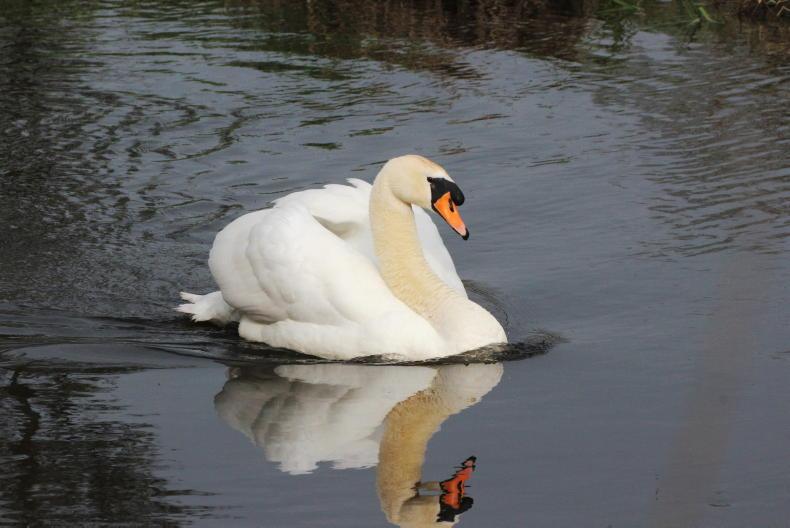There have been three cases of avian flu reported in Ireland since the start of the year.
Analysis of World Organisation for Animal Health and Department of Agriculture data showed that three wild birds have been reported with the H5N1 strain of bird flu.
The first case was confirmed on 16 January by the Central Veterinary Research Laboratory, in a wild greylag goose found in Co Donegal.
On Wednesday 22 January, a second case was reported. This time it was detected in a single whooper swan in Mullingar, Co Westmeath.
Then on Thursday 23 January, a wild peregrine falcon was confirmed to be carrying the H5N1 bird flu in Co Wexford.
There were also two confirmed cases in December 2024 - one was detected in a buzzard in Co Galway on 5 December and the second case was also a buzzard in Co Dublin on 30 December.
Northern Ireland
On 16 and 17 January, bird flu was reported in a wild goose, a buzzard and a whooper swan, found across three separate counties in Northern Ireland.
Subsequently, an avian influenza prevention zone (AIPZ) was introduced on Saturday 18 January placing a legal requirement on all bird keepers in Northern Ireland to follow strict biosecurity measures.
Since November 2024, there have been 18 confirmed outbreaks of highly pathogenic avian influenza (HPAI) in poultry flocks and two in captive birds in England and one case in a poultry flock in Scotland.
Risks
No outbreaks of avian influenza have been detected in poultry in Ireland or Northern Ireland during 2024 or 2025 to date.
However, the confirmation that this virus is circulating in wild birds means that there is an increased threat to poultry of becoming exposed to the disease.
Members of the public are advised not to handle sick or dead wild birds of any species.
Pet owners are advised to keep dogs on a leash when walking where sick or dead wild birds are, or have been, present.
Meanwhile, there is not a requirement for birds in Ireland to be permanently housed from this date, nor are there any restrictions on bird gatherings, shows or sales at this time.
Read more
‘Rare’ human case of H5N1 bird flu detected in UK
England steps up bird flu prevention measures
Bird flu strikes large egg unit in England
There have been three cases of avian flu reported in Ireland since the start of the year.
Analysis of World Organisation for Animal Health and Department of Agriculture data showed that three wild birds have been reported with the H5N1 strain of bird flu.
The first case was confirmed on 16 January by the Central Veterinary Research Laboratory, in a wild greylag goose found in Co Donegal.
On Wednesday 22 January, a second case was reported. This time it was detected in a single whooper swan in Mullingar, Co Westmeath.
Then on Thursday 23 January, a wild peregrine falcon was confirmed to be carrying the H5N1 bird flu in Co Wexford.
There were also two confirmed cases in December 2024 - one was detected in a buzzard in Co Galway on 5 December and the second case was also a buzzard in Co Dublin on 30 December.
Northern Ireland
On 16 and 17 January, bird flu was reported in a wild goose, a buzzard and a whooper swan, found across three separate counties in Northern Ireland.
Subsequently, an avian influenza prevention zone (AIPZ) was introduced on Saturday 18 January placing a legal requirement on all bird keepers in Northern Ireland to follow strict biosecurity measures.
Since November 2024, there have been 18 confirmed outbreaks of highly pathogenic avian influenza (HPAI) in poultry flocks and two in captive birds in England and one case in a poultry flock in Scotland.
Risks
No outbreaks of avian influenza have been detected in poultry in Ireland or Northern Ireland during 2024 or 2025 to date.
However, the confirmation that this virus is circulating in wild birds means that there is an increased threat to poultry of becoming exposed to the disease.
Members of the public are advised not to handle sick or dead wild birds of any species.
Pet owners are advised to keep dogs on a leash when walking where sick or dead wild birds are, or have been, present.
Meanwhile, there is not a requirement for birds in Ireland to be permanently housed from this date, nor are there any restrictions on bird gatherings, shows or sales at this time.
Read more
‘Rare’ human case of H5N1 bird flu detected in UK
England steps up bird flu prevention measures
Bird flu strikes large egg unit in England







 This is a subscriber-only article
This is a subscriber-only article










SHARING OPTIONS: